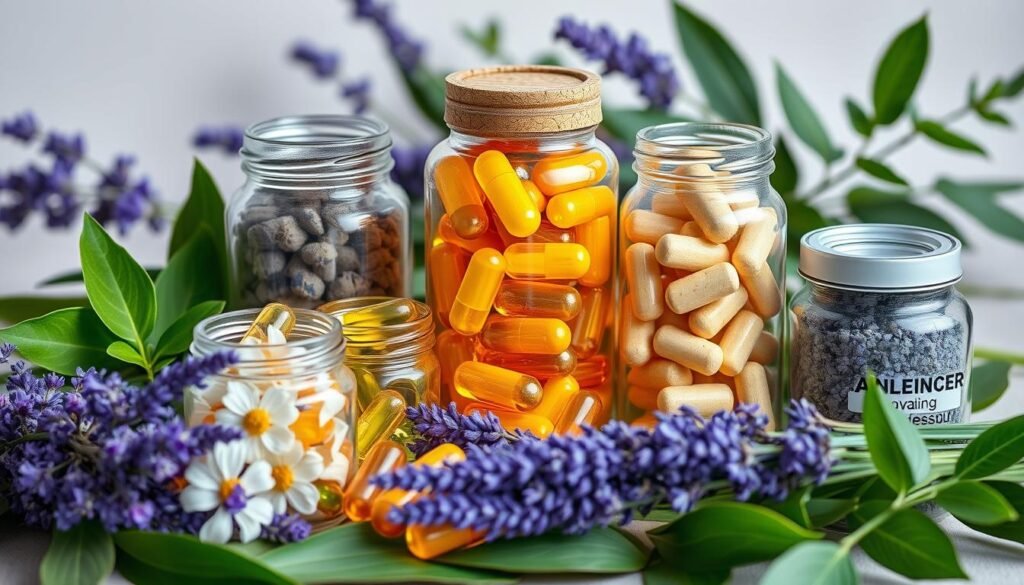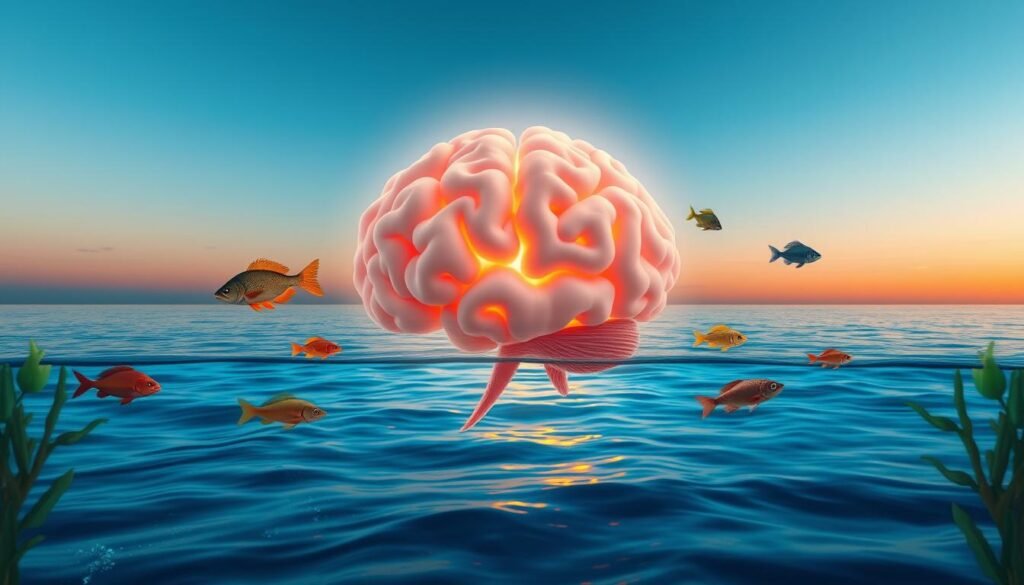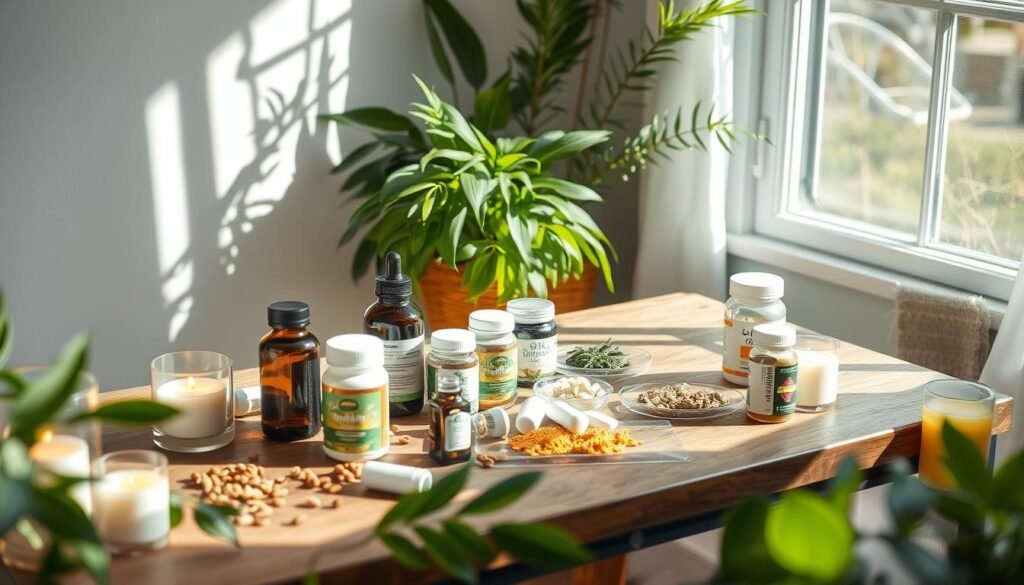More than one-third of people will face an anxiety disorder at some point. This makes anxiety a major mental health issue in the United States. With increased mental health awareness, many are opting for natural remedies. These alternatives to traditional treatments are gaining popularity. The interest in anti anxiety supplements shows a shift towards holistic anxiety management. Finding the best supplements can help manage symptoms and boost overall well-being.
We will explore top-rated anxiety supplements in this article. Looking at their ingredients, benefits, and how they fit into a healthier lifestyle is our goal. Learn how these supplements can be effective for anxiety relief. They help those looking to better manage their mental health and enhance their life quality.
Key Takeaways
- Over a third of people globally will face anxiety disorders.
- Natural remedies for anxiety provide alternative solutions to traditional treatments.
- Effective anti anxiety supplements can enhance well-being.
- Exploring various options helps tailor anxiety management to individual needs.
- Choosing the right supplement can greatly impact mental health outcomes.
Understanding Anxiety and Its Impact
Anxiety affects lots of people in the United States. It’s a natural reaction to stress. But it can grow into anxiety disorders, disrupting lives. Research shows anxiety touches every part of a person’s life. It can make things hard at home or work. Knowing how to spot anxiety early is key to getting help.
Common Symptoms of Anxiety
Spotting anxiety symptoms is the first step to managing it. Some common signs include:
- Sweating
- Muscle tension
- Increased heart rate
- Difficulty concentrating
- Restlessness
These symptoms can come and go and vary in how bad they are. They affect how a person functions day to day. Around 55 million Americans have both anxiety and depression. This shows how mental health issues can be linked.
Types of Anxiety Disorders
There are several types of anxiety disorders. They each present different challenges. Some common types are:
- Generalized Anxiety Disorder (GAD): This is when someone worries a lot about different things in life.
- Social Anxiety Disorder: This involves fear of being in social situations and being judged.
- Obsessive-Compulsive Disorder (OCD): This is having unwanted thoughts and doing repetitive actions to ease anxiety.
About 6.8 million Americans have generalized anxiety disorder. These disorders show why it’s important to understand and deal with anxiety effectively.
Role of Diet and Lifestyle in Managing Anxiety
Diet plays a big part in handling anxiety. Eating the right foods can really make a difference. A diet full of fruits, veggies, and omega-3 fatty acids is great for the mind. Also, adding mindful eating into your lifestyle can boost your mental health.
Importance of Nutrition
What you eat affects how you feel. Cutting down on sugars and processed foods may lower anxiety. Eating whole grains can help make serotonin, which calms you down. But, eating lots of fats and processed foods can make anxiety worse.
Eat fresh to think clear. A study shows diet’s big role in anxiety disorders.
Physical Activity and Its Benefits
Exercise is great for the mind. It releases hormones that make you feel happy. Being active helps with anxiety and sleep. Even easy exercises like walking or yoga can boost your mood over time.
Behavioral Changes to Reduce Anxiety
Changes in behavior can lower anxiety. Practices like meditation and less screen time before bed help control emotions. Eating right and staying hydrated are key too. Not drinking enough water can worsen anxiety. Changing your lifestyle can really improve mental health.
| Nutrient | Food Sources | Benefits |
|---|---|---|
| Omega-3 Fatty Acids | Salmon, Chia Seeds, Walnuts | Improves mood stability |
| B Vitamins | Eggs, Fortified Cereals, Lentils | Supports cognitive function |
| Magnesium | Spinach, Almonds, Black Beans | Helps regulate mood |
Popular Anti Anxiety Supplements
There are many ways to ease anxiety, including natural remedies. More and more people use supplements to help. There are a lot of popular anxiety supplements out there. It’s good to look at them to find the best one for you and your health.
Overview of Natural Remedies
Natural remedies are becoming popular for handling anxiety. They support the body in a holistic way. Things like magnesium and omega-3 fatty acids can really help. Studies prove they work well for fighting anxiety.
- Magnesium: About half of Americans don’t get enough magnesium. This mineral is important for our nerves. Getting enough can reduce anxiety.
- Omega-3 Fatty Acids: Studies say taking at least 2000 mg daily can cut down on anxiety.
- Vitamin D: Over a third of us don’t get enough Vitamin D. It’s key for staying in a good mood.
Best Supplements for Anxiety
Choosing the best supplements for anxiety means looking at your options. Some tops ones include:
| Supplement | Benefits | Recommended Dosage |
|---|---|---|
| Magnesium | Supports nervous system health, may calm anxiety | 420 mg for men; 320 mg for women |
| Omega-3 Fatty Acids | May help reduce anxiety symptoms | 2000 mg per day |
| Vitamin D | Improves mood and supports mental health | 1600 IU |
| B Vitamins | Supports cognitive function, reduces anxiety | 250 mg of B1, 36 mg of niacin |
Looking into these supplements can guide you to what might work for you. You can find more information and studies here. Always talk to a healthcare professional before starting any new supplement to make sure it’s safe and right for you.
Herbal Supplements for Anxiety Relief
Herbal supplements are getting popular for managing anxiety. Kava, Passion Flower, and Valerian Root are popular choices. It’s important to know their uses, benefits, and risks. This knowledge helps people make good decisions about using these herbs for anxiety.
Kava: Use and Risks
Kava comes from the kava plant’s root and is famous for its calming effect. People often use Kava to reduce anxiety. However, some users reported severe liver damage linked to Kava. So, talking to a healthcare provider before using Kava is critical.
Passion Flower: Effects and Recommendations
Passion flower might help with anxiety symptoms. Research suggests benefits like reduced restlessness. It’s usually taken in doses around 700 mg. However, more research is needed to fully back its effectiveness.
Valerian Root: Benefits and Limitations
Valerian root has been used for a long time to help with relaxation and sleep. Some people find it useful for anxiety as well. Yet, the National Center for Complementary and Integrative Health says there’s not enough evidence on its effectiveness for anxiety and depression. Pregnant people and kids should be cautious with valerian root.
| Herb | Potential Benefits | Risks and Limitations |
|---|---|---|
| Kava | Calmative effects, stress reduction | Severe liver damage; requires medical consultation |
| Passion Flower | Reduces restlessness and anxiety | Limited data on effectiveness; caution needed |
| Valerian Root | May aid in relaxation and sleep | Insufficient evidence for anxiety; safety concerns in specific populations |

Vitamins and Minerals for Anxiety Support
Nutrients like vitamin D, magnesium, and B vitamins are key for mental well-being. They help manage anxiety and boost mood. Knowing how these nutrients affect mental health is important.
Vitamin D: Its Role in Mood Regulation
Vitamin D affects our mood greatly. Having enough vitamin D might help ease anxiety. People with low vitamin D levels often face mood challenges.
Those dealing with anxiety might have less vitamin D. Eating foods with vitamin D or taking supplements can help. It’s a useful part of treating anxiety with vitamins.
Magnesium: Importance for the Nervous System
Magnesium is vital for both physical and mental health. It keeps our nervous system working right. It also fights anxiety by lowering stress hormones.
Half of people in the US don’t get enough magnesium. This lack might increase anxiety. Taking 400-600 mg daily may help reduce anxiety.
B Vitamins: Their Impact on Mental Health
B vitamins, like B6 and B12, are crucial for mental health. A study showed B6 helps with anxiety and depression. These vitamins are important for nerve function and energy.
Having enough B vitamins can improve mood and aid anxiety. They are an important part of a healthy diet for mental well-being.
| Nutrient | Role in Anxiety Management | Sources |
|---|---|---|
| Vitamin D | May improve mood and reduce anxiety symptoms | Fatty fish, egg yolks, fortified foods |
| Magnesium | Helps manage stress and lower cortisol levels | Leafy greens, nuts, seeds, whole grains |
| B Vitamins (B6, B12) | Essential for nerve function and mental health | Meat, dairy products, fortified cereals |
Omega-3 Fatty Acids and Their Benefits
Omega-3 fatty acids help keep our brains healthy and play a crucial role in mental wellness. These essential fats, especially EPA and DHA, are vital for strong brain function. Many Americans don’t get enough omega-3s, which could impact mental health.
How Omega-3s Affect Brain Health
Omega-3s and brain health are closely linked. These fats make up brain cells, supporting our thinking and emotions. Eating omega-3-rich foods like fatty fish can improve mood and reduce anxiety.
Research Supporting Omega-3s for Anxiety
Recent research on omega-3 for anxiety shows these fats can help ease anxiety symptoms. A review of 19 trials with 2,240 participants from 11 countries found significant benefits. On average, participants took 1605.7 mg/d of omega-3 and saw considerable improvement.
Doses over 2000 mg/d were even more effective for those with clinical anxiety. This suggests omega-3s might be a safer treatment option for anxiety, which affects one in three people globally.

| Parameter | Omega-3 Supplement Group | Control Group |
|---|---|---|
| Number of Participants | 1203 | 1037 |
| Mean Age | 43.7 years | 40.6 years |
| Mean Female Proportion | 55.0% | 55.0% |
| Mean Omega-3 Dosage | 1605.7 mg/d | N/A |
| Effect Size (Hedges g) | 0.374 | N/A |
Studies all agree that omega-3s can boost mental health, especially for anxiety. People wanting to manage their anxiety differently may find omega-3 supplements helpful.
Newer Trends in Anxiety Relief Supplements
As wellness trends change, people look for new ways to manage anxiety. L-theanine and melatonin are now popular. They are seen as natural options compared to other medications.
L-Theanine: The Calming Amino Acid
L-theanine is mostly in green tea. It’s known for its L-theanine benefits in stress reduction. Usually, it’s taken in 200 to 400 mg doses daily. This amino acid helps calm users and might lower cortisol levels.
Combining L-theanine with GABA is becoming more common. Even though a few studies suggest GABA in oolong tea can reduce stress, more research is needed. Outcomes vary among individuals. Although considered safe, it’s best to talk to a doctor before mixing L-theanine with other supplements.
Melatonin: Its Role in Sleep and Anxiety Management
Melatonin supplements are popular for sleep issues and melatonin for anxiety. This hormone helps control sleep, which is key for anxiety, especially when lack of sleep makes it worse. Studies show that good sleep improves mental health.
Using melatonin can help in two ways. It creates a soothing sleep environment and reduces anxiety.
Best Practices for Choosing Anxiety Relief Supplements
Finding the right anxiety relief supplements requires careful thought. Anxiety is the top mental illness in the U.S. It affects over 44% of adults. Knowing how to pick the right supplements is key.
Choosing without advice can cause bad interactions. It’s important to think about safety and how well they work.
Consulting with Health Professionals
Talking to healthcare providers before starting supplements is a must. They check your health and medications. This ensures your supplements won’t cause harm. Many have vitamin and mineral shortages that affect anxiety.
Nearly half of Americans lack enough magnesium, which is important for mental health. A doctor can suggest the right supplements. This improves health and reduces risks.
Understanding Dosages and Safety
Knowing how much to take is key for safety. Each supplement has its own recommended amount. For anxiety, magnesium doses range from 75 to 360 mg a day.
It’s crucial not to take too much. For magnesium, don’t go over 350 mg a day. This helps avoid side effects like nausea. Choosing doses carefully makes managing anxiety safer.

Real-Life Success Stories with Anti Anxiety Supplements
Many people have shared their success stories with anxiety supplements. These stories show how these remedies can greatly help in dealing with anxiety. People use different herbal treatments and dietary supplements to find relief.
Personal Experiences Using Natural Remedies
Andrew, 29, started feeling anxious about four years ago. He was going through a lot, like losing his job and welcoming his first baby. He did extensive research and talked to many experts before finding help in natural remedies. Andrew’s story shows that big life changes can also lead to emotional healing.
Maria went from battling daily anxiety to improving her mental health by facing her fears. Her story highlights the importance of experiencing anxiety to grow and find relief. Together, their stories show that managing anxiety is a journey without a clear end.
Clinical Findings Supporting Herbal Treatments
Clinical studies also support herbal treatments for anxiety relief. Around 40 million American adults suffer from anxiety disorders. This has led many to consider herbal supplements as a way to manage their condition.
Natural anti-anxiety supplements have been found to boost cognitive function and well-being. The Canadian Journal of Psychiatry noted that 1 in 6 people will face an anxiety disorder in their life. This has increased the demand for natural remedies.
| Name | Age | Years of Experience with Anxiety | Key Events | Approach to Relief |
|---|---|---|---|---|
| Andrew | 29 | 4 | Job changes, marriage, birth of child | Natural remedies, reading |
| Maria | Not specified | Not specified | Daily anxiety, depersonalization | Facing fears, therapeutic approach |
Conclusion
In summary, looking into anxiety supplements shows us the need for a well-rounded approach to manage anxiety well. About 6.8 million people in the U.S. have generalized anxiety disorder. So, checking out different treatments like herbal remedies could help. Herbs like kava and passionflower have shown promise in several studies.
Also, making changes to your lifestyle is key to fighting anxiety. Eating right, exercising, and adjusting your behavior can boost the effectiveness of supplements. If you’re thinking about supplements, it’s crucial to talk to experts. They can guide you on safe amounts and possible side effects. There’s a lot of research backing up natural remedies. This highlights how important a well-thought-out plan is for those trying to manage their anxiety.
Finally, exploring your options carefully and getting advice from healthcare experts can help personalize your approach to anxiety. Adding these methods into your everyday life can put you on the path to a more peaceful mind.